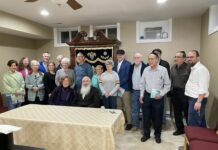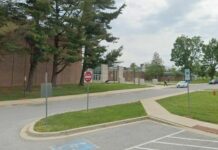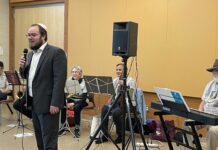Moses Montefiore Anshe Emunah Hebrew Congregation is capping off the second year of operation of its Hebrew school program, and is more than eager to start its third.

Founded in February 2022, the Sylvia Rosenblatt Hebrew UnSchool, despite boasting a modern Orthodox curriculum, is a rather unorthodox congregational school that takes experimental approaches to engaging young students in Jewish education.
Currently, the school serves three levels: “First Steps,” for children in kindergarten through second grade; “T-Kids,” for third through fifth grade; and “Next Steps,” for sixth through eighth grade. The program starts children with Jewish education early on, and helps them continue engaging with it past their b’nai mitzvah.
The Sylvia Rosenblatt Hebrew UnSchool is not MMAE’s first Hebrew school, but the synagogue’s prior program, Anshe Emunah Hebrew School, ceased operations many years ago. Rabbi Eliezer “Eli” Finkelstein, MMAE’s assistant rabbi and its third rabbinic resident, estimates that the original Hebrew school operated around 20-30 years ago. MMAE was without a Hebrew school until the synagogue decided to create a new program after the COVID-19 pandemic.
“I was tasked with setting it up after I got here in 2021. It’s something we’ve been wanting to do for a while, and this is the most success we’ve had [with an educational program] in a long time,” he said.
Finkelstein said that many adults and teenagers, who attended Hebrew school when they were younger, did not have positive experiences with congregation school, with many remembering it as a hindrance and something they did not enjoy doing.
In order to combat this negative perception of Hebrew schooling, the Sylvia Rosenblatt Hebrew UnSchool takes the approach of associating Jewish education with positive experiences. As the name implies, MMAE’s aim is to rebuke the common perspective that Hebrew school is boring and something students should dread rather than look forward to and enjoy.
“The idea of an ‘UnSchool’ was suggested to us by Rabbi [Yerachmiel] Shapiro, and the point is that we want to present ourselves as something different,” Finkelstein explained. “We don’t want people coming in with the same old expectation of what a Hebrew school is, but with fresh eyes. We have classes and we have teachers, but we’re trying new things that hopefully kids will be excited about.”
The school’s curriculum is meant to be more hands-on than a typical Hebrew school, and features arts and crafts, mock religious ceremonies like Passover seders and field trips.
In addition to creating a more “fun” experience for students, the Sylvia Rosenblatt Hebrew UnSchool is meant to provide its teachers with the flexibility to teach how they want.
“Each teacher’s classroom is their domain, and they can do whatever they want within certain boundaries. We want them to teach in a way they’re comfortable with,” Finkelstein said. “We don’t have a top-down administration, which lets them experiment, try new things and develop closer relationships with their students.”
One parent, Kimberly Jacobs, said that the UnSchool’s teachers are very committed to giving students individual attention. Her son, third grader Avi Jacobs, is currently starting his second year of Hebrew school with them.
“All of the teachers have been really exceptional. They have personalized approaches and go above and beyond, even offering extra tutoring in Torah studies and Hebrew when students need it,” Jacobs said, noting that several teachers offer personalized tutoring over Zoom during the week. “From my perspective, this individualized attention ensures each student really grasps the material and what they’re learning.”
She has also referred other families to the school.
“The curriculum fosters a deep appreciation for our heritage, and we’re really grateful for the enrichment and supportive environment the UnSchool offers,” Jacobs added.
Over its two-year run, the school has already seen success. Its student body has more than doubled, growing from 18 students to 40. Going forward, MMAE is looking for ways to secure funding to establish more permanent classrooms, as the congregation is currently running the school out of several of its multipurpose rooms. The synagogue’s hope is that having classrooms will lead to a more permanent and sustainable program that can support more students and achieve long-term success.
“I hope [what] students take away from their time at the Sylvia Rosenblatt Hebrew UnSchool is that Judaism is not stale or boring. And honestly, I want parents to take away that same message,” Finkelstein noted. “It’s something that is exciting and can be done everywhere, however we choose to bring it into our lives. Whether it’s about being good Jewish scholars or incorporating Judaism into the home, it should mean something.”








My son (6th grader) is at the MMAE Hebrew School since the beginning. This is the only Hebrew School that he has enjoyed and thrived in. The teachers care so much and the curriculum is interesting so it works for him. Previous tries at Hebrew School just didn’t work and he refused to go. So thankful for this opportunity for him!